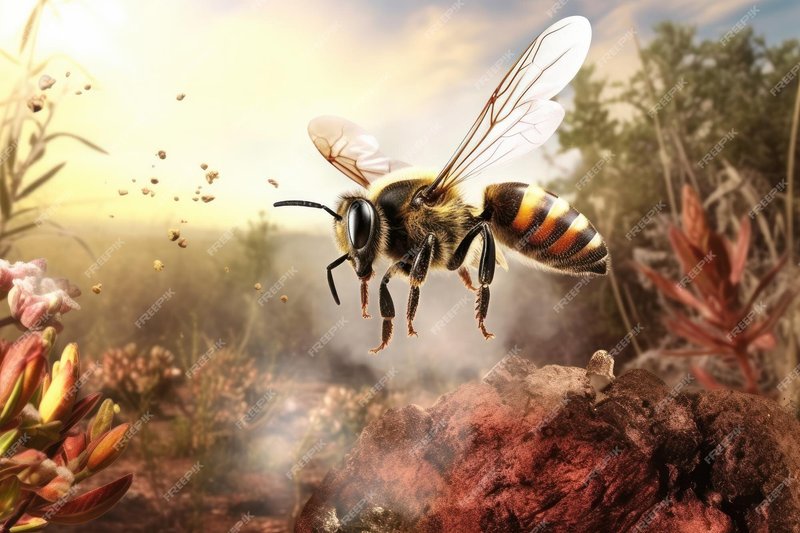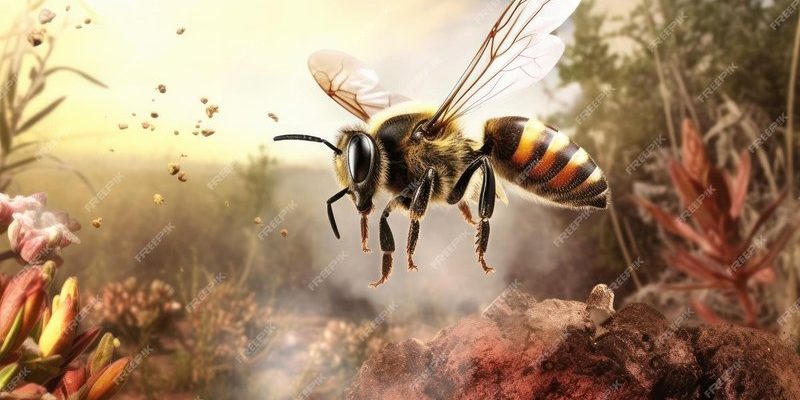
Now, let’s clarify something important: Africanized honey bees are known for their aggressive defense behavior. However, when managed properly, their benefits can outweigh the risks. Think of them as the overzealous bouncers at a club—while they take their job seriously, they also help create a lively atmosphere in your garden or farm by pollinating plants. So, let’s take a closer look at how these buzzing companions can help ease your gardening and farming tasks.
Enhanced Pollination Power
One of the most significant advantages of having Africanized honey bees around is their impressive pollination abilities. These bees are tireless workers. They can visit hundreds of flowers in a single day, transferring pollen as they go. This is crucial for many crops!
When plants are pollinated, they produce fruits, seeds, and vegetables. Without sufficient pollination, yields can be low. Moreover, some plants, like tomatoes and cucumbers, rely heavily on bees for successful pollination. By adding Africanized bees to your garden, you’re increasing your chances of a bountiful harvest.
You might be wondering, “How do I attract these bees?” Simple! Try planting a variety of flowering plants to provide nectar and pollen sources. Wildflowers, sunflowers, and herbs are all great options. Just be sure to give them some space and avoid using harmful pesticides that can scare them away!
Improved Crop Quality
Beyond just quantity, Africanized honey bees can also enhance the quality of your crops. More effective pollination can lead to bigger, tastier fruits and veggies. Imagine biting into a juicy, plump strawberry or a crispy bell pepper—those vibrant flavors are, in part, thanks to the diligent work of bees.
For crops like almonds, blueberries, and apples, quality can significantly improve with greater bee activity. These fruits can develop a better size and consistency, making them more appealing to consumers. That’s great news for farmers looking to sell their produce!
Additionally, healthy plants make for healthier soil. When bees help your crops thrive, the entire ecosystem benefits. Stronger plants can retain soil nutrients and support other wildlife, creating a more balanced environment.
Natural Pest Control
Here’s the thing: a thriving garden or farm can actually help control pests naturally, and bees play a vital role in that. While bees themselves aren’t predators, they contribute to a balanced ecosystem that includes beneficial insects.
When you have diverse plant life thanks to pollinators, such as Africanized bees, you attract a variety of other insects. Some of these bugs, like ladybugs and lacewings, feast on pests that might otherwise munch on your crops. This means less need for chemical pesticides, which can harm both the environment and your plants.
For instance, by planting flowering herbs around your vegetable garden, you can entice these helpful insects to your garden. Not only does this keep your plants healthy, but it also promotes biodiversity. It’s a win-win situation!
Increased Biodiversity
Biodiversity is essential for a healthy ecosystem, and Africanized honey bees can help foster it. These bees pollinate a variety of plants, which in turn supports different forms of wildlife. When you have a range of plants thriving in your garden, you provide habitats for birds, butterflies, and other pollinators.
This ripple effect creates a more stable environment. Think of it as building a community. Just like how we need different people with unique skills to make a successful team, nature needs various plants and creatures to thrive.
Moreover, a diverse garden is more resilient to diseases and pests. If one crop fails, others can still flourish, ensuring you have something to harvest throughout the season. By welcoming Africanized honey bees to your space, you’re taking a step towards a more biodiverse and healthy garden.
Educational Opportunities for the Next Generation
Another underrated benefit of having Africanized honey bees around is the educational value they bring. For families and communities, bees create a fantastic opportunity to teach children about nature, ecosystems, and the importance of pollinators.
Imagine a family gathering where kids help plant flowers, excited to see the bees buzzing around. This hands-on experience can spark curiosity about how food grows and the fascinating roles bees play in our environment.
Schools can use gardens with these bees as outdoor classrooms. Students can learn about plant biology, ecology, and even responsibility, as caring for a garden involves nurturing living things. It’s a great way to connect with nature and understand its delicate balance.
Considerations When Working with Africanized Honey Bees
While there are many benefits, it’s essential to approach keeping Africanized honey bees with caution. They can be aggressive if they feel threatened, which makes it crucial to maintain a safe distance and learn proper beekeeping practices. You might be wondering how to do that.
First, consider taking a class or getting advice from experienced beekeepers. They can provide tips on how to manage and respect these bees while still enjoying their benefits. Also, ensure that your garden provides a variety of plants to keep them nourished and content.
Additionally, it might be wise to avoid keeping them in crowded or high-traffic areas. Offering them a space where they can thrive securely ensures that they won’t become a nuisance. Remember, it’s all about respecting their space and understanding their nature.
Final Thoughts on Embracing Africanized Honey Bees
In conclusion, while Africanized honey bees might have a fierce reputation, their impact on gardening and farming can be incredibly positive. From enhancing pollination and crop quality to promoting biodiversity and educational opportunities, these bees offer various benefits that can transform your outdoor space.
So, as you plan your garden or farm, consider inviting these little buzzing helpers into the mix. When managed properly, they can become your allies in cultivating a thriving, vibrant ecosystem. Embrace the buzz and watch your plants flourish with the help of your new tiny friends!

